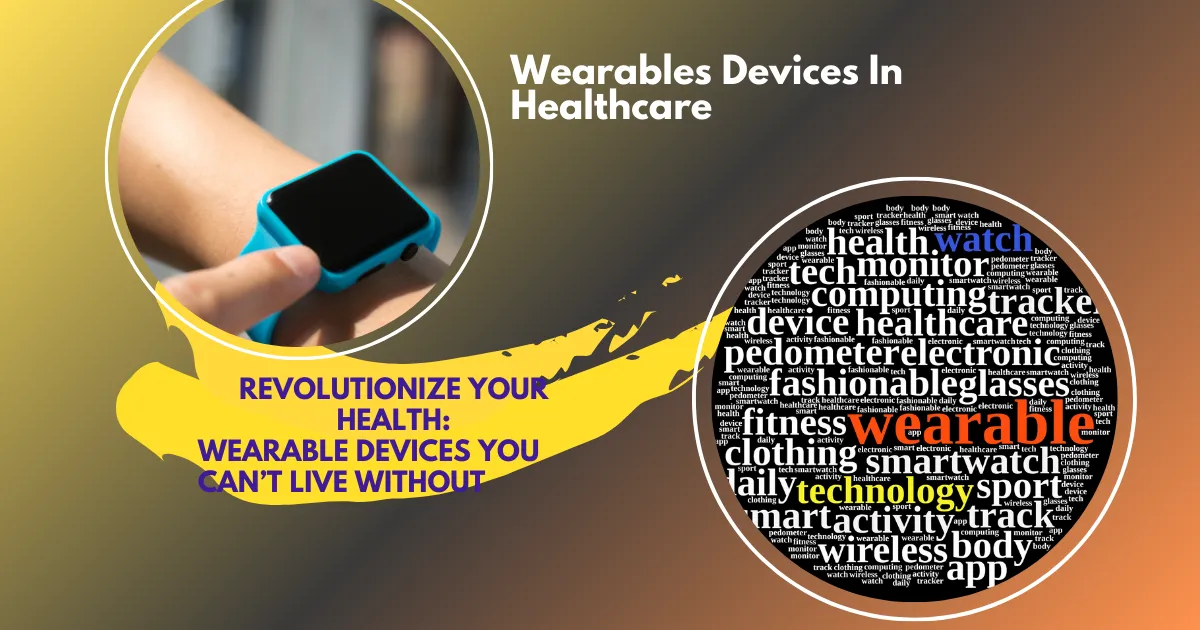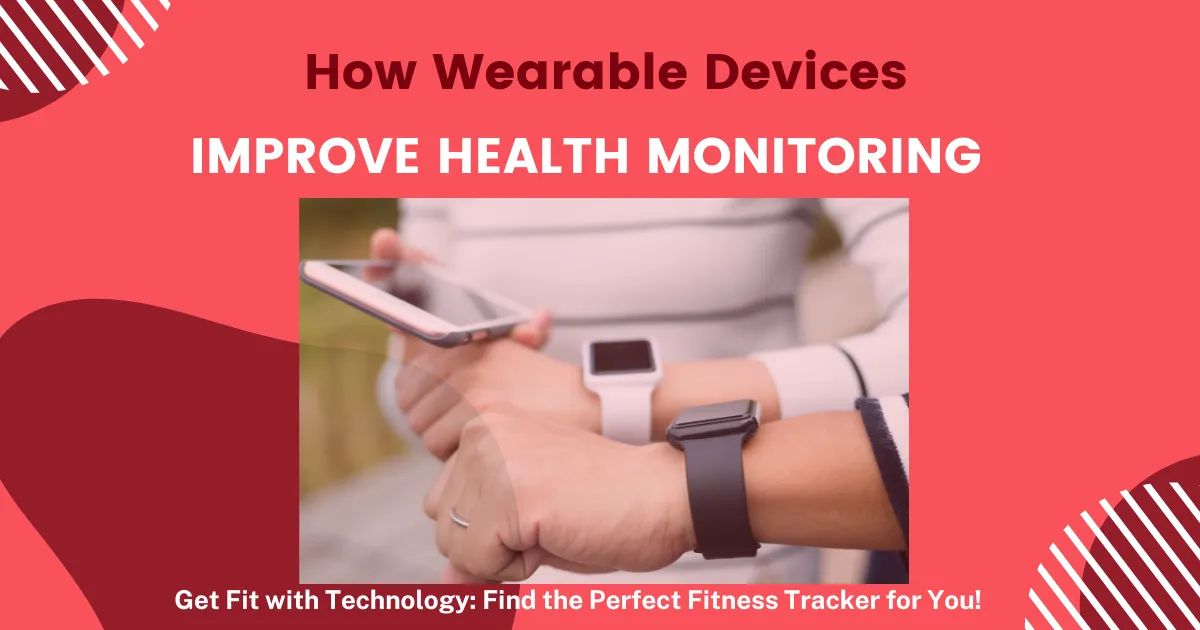Wearables Devices In Healthcare: Imagine having a personal health coach that monitors your heart rate, tracks your sleep patterns, and even reminds you to take a walk after sitting too long. This isn’t a glimpse into the distant future; it’s a reality made possible by modern wearable technology.
As we strive for better health and enhanced well-being, wearable devices are becoming indispensable tools in our daily lives.
What Are Wearable Devices?
Wearables are taking the world by storm, and they’re not going away anytime soon. Wearables (wearables IoT) are electronic technology or devices incorporated into items that can be comfortably worn on a body. These wearable devices track information in real-time.
Wearable devices have motion sensors that take snapshots of your day-to-day activity and sync them with mobile devices or laptop computers. After the invention of smartphones, wearable electronics are the next significant innovation in the world of technology.

Wearables Devices In Healthcare
Addressing Common Objections
Many might question the accuracy of these devices or worry about their complexity. However, technological advancements have significantly improved the precision of health trackers, and user-friendly interfaces make them accessible to everyone, regardless of tech-savviness.
Solving the Problem
Wearable devices offer real-time data that helps you understand your body better, enabling timely health decisions and interventions. Whether managing stress through breathing exercises guided by your fitness tracker or monitoring glucose levels with a diabetic smartwatch, these devices ensure that managing your health is no longer a guessing game.
How to Choose the Right Device
- Identify Your Needs: Consider what health metrics are most important to track.
- Research Device Capabilities: Not all wearables are created equal. Ensure the device you choose can accurately monitor the metrics you care about.
- Check Compatibility: Ensure the device syncs well with your smartphone or other digital tools you use.
- Read Reviews: Learn from the experiences of others who have used the device to ensure it fits your lifestyle.
With a suitable wearable device, monitoring your health becomes integrated into your daily routine, seamlessly providing insights that empower you to live your best life. Embrace the change, equip yourself with knowledge, and take control of your health with the intelligent power of wearables.
Decoding Your Body’s Signals: The Transformative Power of Wearable Devices in Healthcare
Wearable devices have ushered in a new era of personalized healthcare, transcending simple step counting to offer continuous, real-time monitoring and a profound understanding of individual health metrics.
By integrating technology into our daily lives, these innovative tools empower individuals and healthcare professionals with actionable insights, fostering proactive health management, enhancing diagnostic capabilities, and revolutionizing chronic disease management. Let’s delve deeper into some notable wearable devices shaping the healthcare landscape:
Consumer-Focused Wearables: Empowering Personal Wellness
-
Fitbit Charge Series: A cornerstone of the wearable market, the Fitbit Charge series provides a comprehensive overview of daily health. Beyond tracking steps and distance, it meticulously monitors heart rate patterns, sleep stages and quality, activity levels across various exercises, and even skin temperature variations. This holistic data empowers users to identify trends, make informed lifestyle choices, and proactively manage their well-being.
-
Apple Watch Series: A versatile powerhouse, the Apple Watch extends beyond fitness tracking to offer sophisticated health monitoring features. Its capabilities include continuous heart rate monitoring with notifications for unusually high or low rates, on-demand electrocardiogram (ECG) readings to detect potential atrial fibrillation, blood oxygen (SpO2) level measurements, fall detection with emergency SOS, and even temperature sensing for insights into women’s health. Its seamless integration with the Apple Health ecosystem provides a centralized platform for managing diverse health data.
-
Garmin Vivosmart Series: Tailored towards sports and fitness enthusiasts, the Garmin Vivosmart series offers detailed tracking of various activities, GPS capabilities for outdoor workouts, continuous heart rate monitoring with stress level assessments, and sleep analysis. Its focus on performance metrics and recovery insights makes it a valuable tool for optimizing training regimens and overall fitness.
-
Samsung Galaxy Watch Series: A strong contender in the smartwatch arena, the Samsung Galaxy Watch offers a comprehensive suite of health monitoring features, including continuous heart rate, sleep analysis with sleep stage tracking, stress level monitoring, and in some models, even blood pressure measurement and ECG capabilities. Its tight integration with the Samsung Health platform provides a user-friendly data visualization and analysis interface.
-
Whoop Strap: Popular among elite athletes and fitness professionals, the Whoop Strap prioritizes performance, recovery, and strain analysis. Eschewing a screen, it focuses on providing detailed data on heart rate variability (HRV), sleep quality, and exertion levels to optimize training intensity, prevent overtraining, and enhance recovery strategies.
-
Oura Ring: Taking a discreet approach, the Oura Ring tracks vital health metrics from a comfortable and stylish ring worn on the finger. It provides in-depth analysis of sleep quality (including sleep stages, heart rate, and movement), heart rate variability (a key indicator of recovery), and daily activity levels, offering personalized insights for improved sleep and overall well-being.
Medical-Grade Wearables: Revolutionizing Clinical Care
-
BioButton by BioIntelliSense: This small, coin-sized wearable is designed for continuous, medical-grade health monitoring. It autonomously captures a range of vital signs, including respiratory rate, heart rate, and skin temperature. It provides clinicians with a continuous stream of data for early detection of physiological changes and improved patient management, particularly in remote monitoring settings.
-
Philips Biosensor BX100: Specifically designed for hospital environments, the Philips Biosensor BX100 is a wireless wearable sensor that continuously monitors key vital signs such as heart rate, respiratory rate, and posture. This real-time data stream enables proactive patient surveillance, early identification of deterioration, and enhanced clinical decision-making.
-
Fitbit Sense: Positioned as an advanced health smartwatch, the Fitbit Sense incorporates an electrodermal activity (EDA) sensor to detect stress levels. It also features comprehensive heart health monitoring features, including an ECG app for detecting atrial fibrillation and notifications for irregular heart rhythms. Its focus on holistic well-being makes it a valuable tool for both personal and potentially clinical use.
-
Polar H10 Heart Rate Monitor: Renowned for its accuracy, the Polar H10 is a chest strap heart rate monitor favored by athletes and individuals requiring precise heart rate data for sports training and health management. Its high fidelity and reliability make it suitable for applications ranging from optimizing athletic performance to cardiac rehabilitation programs.
Emerging Wearable Technologies: Expanding Monitoring Capabilities
-
Sweat Sensors: Representing a cutting-edge area of wearable technology, sweat sensors are evolving rapidly to monitor a range of biomarkers present in sweat, including electrolytes (sodium, potassium), metabolites (lactate, glucose), and even hormones. These sensors, often integrated into patches or wristbands, offer non-invasive and continuous insights into hydration levels, osmotic balance, muscle fatigue, and potentially even blood glucose levels, opening new avenues for personalized health and performance monitoring.
-
Wearable Glucose Meters (Continuous Glucose Monitors – CGMs): These innovative devices have significantly improved diabetes management. By continuously monitoring glucose levels in interstitial fluid through a small sensor inserted under the skin, CGMs provide real-time glucose readings and trends, eliminating the need for frequent finger pricks. This data is transmitted wirelessly to a smartphone or smartwatch, empowering individuals with diabetes to make informed decisions about their diet, exercise, and insulin dosages, leading to better glycemic control and a healthier life.
The Internet of Things (IoT) in Wearable Healthcare:
The functionality and impact of these wearable devices are significantly amplified by their integration into the Internet of Things (IoT). The IoT ecosystem enables these devices to seamlessly collect, transmit, store, and analyze vast amounts of health data. This interconnectedness facilitates:
- Remote Patient Monitoring: Healthcare providers can remotely track patients’ vital signs and activity levels, enabling timely interventions and reducing the need for frequent in-person visits, particularly for individuals with chronic conditions or those recovering at home.
- Telehealth Integration: Wearable data can be seamlessly integrated into telehealth platforms, providing clinicians with objective physiological information during virtual consultations, leading to more informed diagnoses and treatment plans.
- Personalized Health Insights: AI-powered algorithms can analyze the continuous data streams from wearables to identify patterns, predict potential health risks, and provide customized recommendations for lifestyle modifications, medication adherence, and disease management.
- Emergency Response Systems: Smartwatches’ fall detection and SOS features can automatically alert caregivers or emergency services in critical situations, potentially saving lives.
- Data-Driven Research: Aggregated and anonymized data from wearables can contribute to large-scale research studies, providing valuable insights into disease progression, treatment effectiveness, and population health trends.
The Role of Wearables in a Proactive Healthcare Paradigm:
Wearable devices are increasingly crucial in shifting healthcare from a reactive, illness-focused model to a proactive, wellness-oriented paradigm. By providing individuals with continuous insights into their physiology, these devices empower them to take ownership of their health, adopt healthier behaviors, and engage more actively in their care.
From early detection of subtle health changes to personalized feedback for lifestyle improvements, wearable technology is a powerful catalyst for preventive health, optimized sports training, and effective chronic disease management, ultimately contributing to a more accessible, efficient, and patient-centric healthcare system.
| IoT Aspect in Wearable Healthcare | Description |
|---|---|
| Remote Patient Monitoring | IoT enables healthcare providers to remotely track patients’ vital signs and activity levels collected by wearables, facilitating timely interventions and reducing the need for frequent in-person visits. |
| Telehealth Integration | Wearable data seamlessly integrates into telehealth platforms, providing clinicians with objective physiological information during virtual consultations for more informed diagnoses and treatment plans. |
| Personalized Health Insights | AI algorithms analyze continuous data streams from wearables within the IoT ecosystem to identify patterns, predict potential health risks, and provide personalized recommendations for lifestyle modifications and disease management. |
| Emergency Response Systems | Features like fall detection and emergency SOS in IoT-connected smartwatches can automatically alert caregivers or emergency services in critical situations, improving response times and potentially saving lives. |
| Data-Driven Research | Aggregated and anonymized data from wearables within the IoT infrastructure can contribute to large-scale research studies, providing valuable insights into disease progression, treatment effectiveness, and population health trends. |
Sweat Sensors: Decoding Your Body’s Signals
Sweat, a seemingly simple bodily function, holds a wealth of information about our health, fitness, and stress levels. For years, understanding the nuances of sweat has been relegated to subjective observations – feeling clammy, noticing damp patches, or experiencing the unpleasant sting of sweat in the eyes.
However, technological advancements have ushered in a new era of personalized health monitoring by developing sophisticated sweat sensors. These small but powerful devices are revolutionizing how we understand our bodies, offering real-time insights into our physiological state and paving the way for proactive health management.
The Science of Sweat:
Before delving into the technology, it’s essential to understand the complex process of sweating. Sweat is primarily produced by eccrine glands, which are distributed throughout the body. Its primary function is thermoregulation – cooling the body through evaporative heat loss.
However, sweat is more than just water. It contains a complex mixture of electrolytes, including sodium, potassium, chloride, and magnesium, as well as trace amounts of other substances. The composition of sweat can vary significantly based on factors like hydration status, exercise intensity, stress levels, and even underlying health conditions.
How Sweat Sensors Work:
Sweat sensors are small, wearable devices that adhere to the skin, often as a patch or band. They employ a variety of technologies to analyze the components of sweat. Some sensors measure the rate of sweat production, while others analyze the concentration of specific electrolytes.
Electrochemical sensors are commonly used to detect sodium and chloride levels, crucial indicators of hydration status. Other sensors may use optical or microfluidic techniques to analyze a broader range of sweat components.
Benefits and Applications:
The information provided by sweat sensors has a wide range of applications, spanning from athletic performance enhancement to disease management:
-
Athletic Performance: For athletes, sweat sensors provide valuable data for optimizing training and preventing dehydration. By monitoring sweat rate and electrolyte loss, athletes can personalize their hydration strategies and ensure they adequately replenish fluids and minerals during intense workouts. This can help prevent muscle cramps, heat exhaustion, and other performance-limiting issues.
-
Real-time feedback allows athletes to adjust their pace and intensity based on their body’s response, leading to more efficient and practical training.
-
-
Hydration Management: Proper hydration is crucial for overall health, not just for athletes. Sweat sensors can provide personalized feedback on hydration status, helping individuals understand their fluid needs and avoid dehydration. This is particularly important for individuals at risk of dehydration, such as older people, children, and those working in hot environments.
-
Health Monitoring: Sweat sensors hold promise for noninvasive health monitoring. Changes in sweat composition can indicate various health conditions, such as cystic fibrosis, diabetes, and stress. Researchers are exploring using sweat sensors to detect biomarkers associated with these conditions, potentially enabling early diagnosis and personalized treatment. For example, sweat chloride levels are a key diagnostic marker for cystic fibrosis.
-
Stress Management: Sweat production is also influenced by the sympathetic nervous system, which is activated during stress. By monitoring sweat rate and conductivity, sweat sensors can provide insights into an individual’s stress response. This information can be used to develop personalized stress management strategies, such as biofeedback or mindfulness techniques.
-
Personalized Medicine: As sweat sensor technology advances, it will likely play an increasingly important role in personalized medicine. The ability to continuously monitor an individual’s physiological state through sweat analysis will allow healthcare providers to tailor treatments and interventions based on their specific needs.
Challenges and Future Directions:
While sweat sensor technology has made significant strides, there are still challenges to overcome. One challenge is the accuracy and reliability of the sensors over extended periods. Sweat can be corrosive, and the sensors must be robust enough to withstand prolonged use. Another challenge is integrating the data collected by the sensors into user-friendly platforms. The information needs to be presented in a way that is easy to understand and actionable.
The future of sweat sensors is bright. Researchers are developing more sophisticated sensors to analyze a broader range of sweat components, including proteins and hormones. They are also exploring using artificial intelligence and machine learning to analyze the data collected by the sensors and provide personalized insights.
- As the technology matures, sweat sensors are poised to become an integral part of our daily lives, empowering us to take control of our health and well-being.
- From athletes striving for peak performance to individuals seeking to manage chronic conditions, sweat sensors offer a window into our bodies, providing valuable information that can help us live healthier, more fulfilling lives.


Step into the world of cutting-edge wearables and discover how these innovative solutions are revolutionizing industries.
Love how wearable devices are transforming our health journey!
This is fascinating! I’m curious to know more about the accuracy and reliability of these wearable devices. How do they ensure data privacy and security? #wearabletech #healthtech